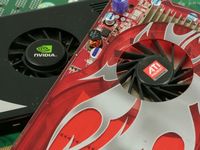Extreme Graphics Card Tuning
Conclusion
Our overclocking tests ended on some fairly positive results. Our GeForce and Radeon cards both played ball, and we were able to increase speed by approximately 20% on each GPU. That’s almost like moving up to the next card in the series! All without doing any very complex or very risky manipulations, and without spending one additional cent. We trust we’ve convinced you that overclocking a graphics card is worthwhile.
If you develop a taste for graphic overclocking, you’ll soon find out that we’re a long way from having covered all the territory. The Web and its forums are full of advice from much more adventurous users who aren’t afraid to try some much hairier overclocking. We’re talking about modifications to the cooling system, changing voltages by soldering additional resistors in the right places on the card and using pens with conductive ink (hard vmod). Those are the kinds of approaches that are being used to go far beyond the limits we’ve stayed within here.
For example, numerous Radeon HD 3870s have been pushed beyond a gigahertz, which is a really extreme GPU clock speed. All these complex modifications are described in numerous tutorials on numerous specialized forums. We’ll let the more fearless among you venture into that territory if you want to.
Finally, note that while we’ve focused only on overclocking, the utilities and BIOS editors we’ve used can also lower your card’s frequencies in order to limit power consumption, heating and noise when all your GPU’s firepower isn’t needed. After all, you can be a fan of high performance and still care about the environment!
Get Tom's Hardware's best news and in-depth reviews, straight to your inbox.
-
jimmysmitty I OC'ed my HD2900Pro 1GB to a 850MHz GPU (from 600MHz) and 2250MHz memory (from 1850MHz). So I technically got alomost a 50% OC. But mine is just a HD2900XT 1GB just down clocked.Reply -
brendano257 The HP disk utility asks me for DOS files to write to the disk where would I find these?Reply -
Shadow703793 To any one interested in modding nVidia BIOS:Reply
http://www.tomshardware.com/forum/forum2.php?config=tomshardwareus.inc&cat=29&post=246611&page=1&p=1&sondage=0&owntopic=3&trash=0&trash_post=0&print=0&numreponse=0"e_only=0&new=0&nojs=0
-
randomizer By the way, the first step in Nibitor is to select the device, before you can read the BIOS ;) I'd like to know how you "deleted" the "Extra" frequencies. Did you set them to 0 or did you actually set the number of performance levels to 3 instead?Reply -
randomizer A good idea for doing blind flashes is to have a second floppy (with the DOS files on obviously) but add a file called autoexec.bat with the following line in it:Reply
nvlfash -4 -5 -6 -a -y file.rom
where file.rom is the filename and it could also be a .bin file. That will flash the card without you having to hope you typed it in right, just make sure you gave it a good minute or two before restarting so you don't corrupt the BIOS. -
randomizer Typo correction - the line in the autoexec.bat file should read:Reply
nvflash -4 -5 -6 -a -y file.rom
Why can't I edit my own comments? -
matthieu lamelot randomizerBy the way, the first step in Nibitor is to select the device, before you can read the BIOS I'd like to know how you "deleted" the "Extra" frequencies. Did you set them to 0 or did you actually set the number of performance levels to 3 instead?Reply
Setting them to zero wouldn't work, you have to set them to dash ( - ), as you can see in the screenshot on page 6. AFAIK, Geforce 8 won't boot correctly if you suppress their "extra" performance level. -
perzy with the really extremly bad cooling on todays GPU's ...a little plastic fan with sleeve bearings that runs slower and slower before it stops completly.. i'm very cautious. New cooling? Yeah, but that costs and then i get a 10% oc. Hmm.Reply
